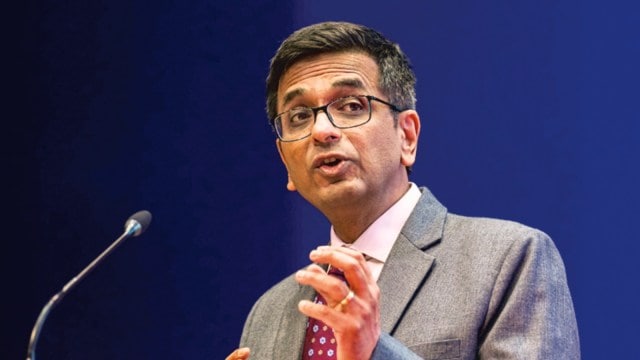My two daughters have transformed the way I see the world and engage with it: CJI Chandrachud
“We must ensure our legal, social, and institutional systems are designed not just to accommodate, but to actively protect and empower these children,” the CJI said.
 Mentioning the redesigning of the statue of the Lady of Justice, the CJI stressed the law is not blind and that it views everyone equally. (PTI Photo)
Mentioning the redesigning of the statue of the Lady of Justice, the CJI stressed the law is not blind and that it views everyone equally. (PTI Photo)Pointing out that challenges faced by persons with disabilities extend far beyond issues of physical accessibility, Chief Justice of India D Y Chandrachud said on Saturday that his two foster daughters have transformed the way he sees the world and engages with it.
Delivering the keynote address at the National Annual Stakeholders Consultation on Child Protection on ‘Protection Services for Children with Disabilities’, the CJI said, “This year’s theme holds a special place in my heart: the protection and well-being of children with disabilities. As someone who fosters two wonderful young daughters, I am reminded daily of the joy, purpose, and love they bring to my life. They have transformed not only how I see the world but also how I engage with it—strengthening my commitment to creating a more inclusive society where every child, regardless of their abilities, is cherished and protected.”
The CJI said besides the issue of physical accessibility, people with disability “must also contend with entrenched societal biases, stereotypes, and misconceptions that permeate nearly every facet of life.”
“These barriers are particularly pronounced when it comes to children, whose futures depend on our willingness to challenge these limitations. For children in conflict with the law, these challenges can be even more severe, as they navigate a system that may not recognize their unique vulnerabilities. In the United States, studies show that as many as 70% of youth who enter the justice system have a mental health, sensory or learning disability,” said the CJI.
“We must ensure that our legal, social, and institutional systems are designed not just to accommodate, but to actively protect and empower these children,” he added.
Pointing out that one of the most significant challenges is the absence of reliable data on children with disabilities, especially those who are survivors of sexual offenses or who come into conflict with the law, CJI Chandrachud stressed the need to prioritise improving data collection systems within the Juvenile Justice framework.
“Data is the foundation for meaningful reforms, enabling policymakers to develop tailored interventions, measure their impact, and adapt strategies accordingly. Without it, children with disabilities will continue to fall through the cracks, unseen and underserved,” said the CJI.
He said that The Rights of Persons with Disabilities Act, 2016, is a significant step toward ensuring that children with disabilities receive the care and rights they deserve, as it provides a comprehensive framework for the rehabilitation, empowerment, and inclusion of persons with disabilities in society.
The Act, the CJI said, states that anyone who commits an offense against a disabled child is liable to twice the penalty. “While these laws acknowledge the vulnerability of children with disabilities, their impact on the ground is often limited. The framework remains largely reactive, placing more emphasis on post-offense penalties rather than proactive prevention, support, and rehabilitation,” he said.
CJI Chandrachud asked if judges, police officers, and lawyers are “equipped to understand the unique challenges faced by children with disabilities?” and added that “sadly, the answer is often no.”
He said that professionals within the justice system require ongoing training and sensitisation to comprehend the nuanced vulnerabilities of these children. “Sensitisation would not only reduce the re-victimisation of children in legal proceedings but also promote more compassionate handling of cases.”







